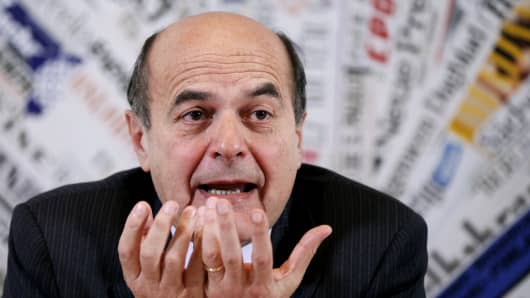Italian parties reacted skeptically on Friday to center-left leader Pier Luigi Bersani's call for a government backed by all political forces, complicating President Giorgio Napolitano's efforts to end the stalemate left by last month's election.
Napolitano has ended consultations with the parties to try to form a government after the election which gave the center-left control of the lower house but left it short of a majority in the Senate and thus unable to govern alone.
He is expected to announce later on Friday whether he has decided to give Bersani a mandate to try to muster support from other parties, or has opted for some other solution, such as asking a respected outside figure to try to build a broad coalition.
With no party holding a majority in parliament, Italy - the euro zone's third largest economy - faces the prospect of weeks of uncertainty just as the bank crisis in Cyprus has revived fears of a renewed bout of financial market turmoil.
Bersani said late on Thursday that he hoped to be able to present a limited program of economic and institutional reforms that could be backed by all forces in parliament, but he faces resistance from the other parties.
"The reality is that whoever gets a mandate to form a new government has to be able to show they have a stable political majority already in place. And at this moment, Bersani can't be that person," said Renato Brunetta, the lower house leader of Silvio Berlusconi's center-right People of Freedom party (PDL).
If Bersani cannot gather enough support, Italian media have speculated that Napolitano could ask Senate speaker and former top anti-mafia judge Pietro Grasso to try to form a government. He has said he would be willing to serve the state in any way he can.
However the anti-establishment 5-Star Movement led by former comic Beppe Grillo has repeatedly said it will not back a government led by any other party, leaving Bersani needing a deal with the center-right if he is to have a chance of success.
Former Prime Minister Berlusconi, who has been lifted by recent opinion polls showing his support is rising, says the inconclusive election result shows that Italy has not made a clear choice and that the center-left does not have the right to govern alone.
He has called for a cross-party coalition with Bersani's Democratic Party (PD) that would give his group a share in government and the right to decide the next president to succeed Napolitano, whose term ends in May.
Recession
If no durable accord can be reached, Italy faces a return to the polls within months, delaying any prospect of substantial reform to its stagnant economy, now stuck in its longest recession in 20 years.
Napolitano, the head of state, has given no hint of what he intends to do beyond telling the speakers of parliament that it was "absolutely necessary" to form a government, suggesting he will try to avoid early elections if at all possible.
"President Napolitano did not make his intentions known in our meeting yesterday," Luigi Zanda, head of the PD's Senate group, told state radio RAI on Friday.
Financial markets have been watching the political uncertainty closely although there has so far been no sign of the panic that gripped investors during the 2011 crisis which brought down the last Berlusconi government.
The main barometer of confidence, the spread between yields on Italian and German 10-year government bonds, has risen since the beginning of the year by some 20 basis points to 320 points, well short of the level of more than 550 seen in late 2011.
However Italy's 2-trillion-euro public debt is vulnerable to any bond market turbulence and public finances have deteriorated sharply during the recession, despite the tax hikes and spending cuts imposed by outgoing Prime Minister Mario Monti.
Monti's caretaker government cut its economic forecasts on Thursday and now sees gross domestic product contracting by 1.3 percent this year following the 2.4 percent decline in 2012. The budget deficit is expected to hit 2.9 percent of output, just within EU limits.


